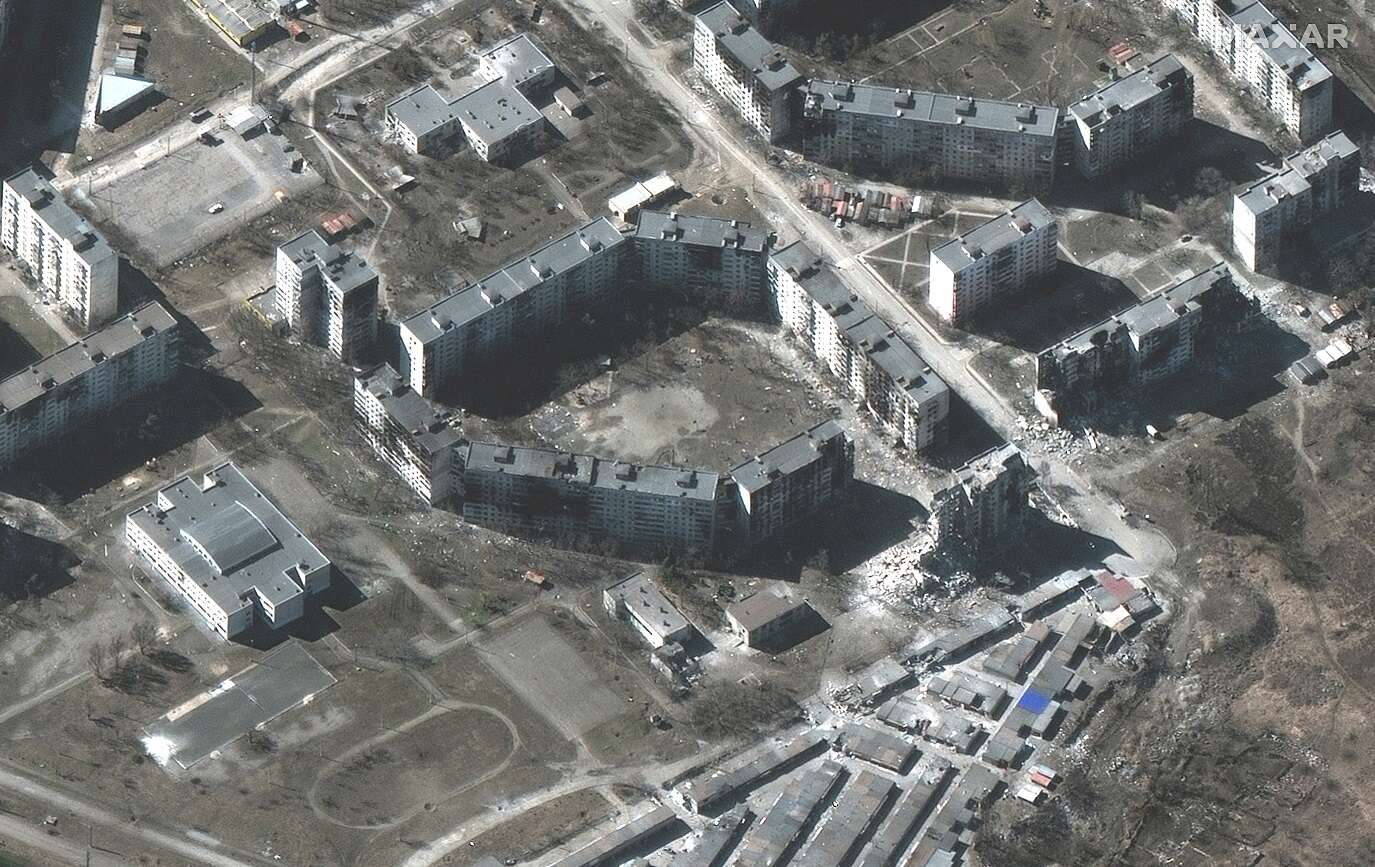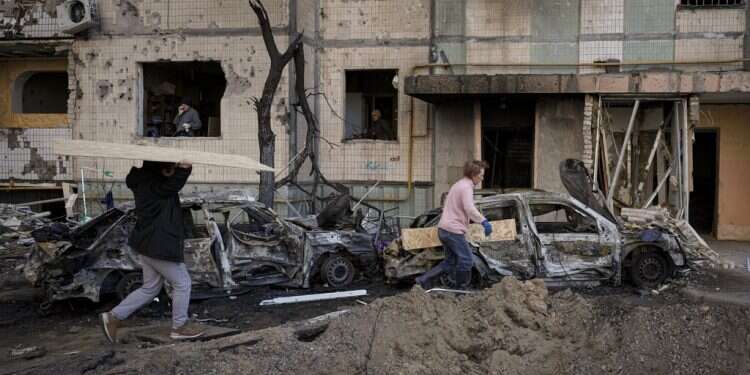Ukrainian forces battled continuing Russian efforts to occupy Mariupol and claimed to have retaken a strategic suburb of Kyiv on Tuesday, mounting a defense so dogged that it is stoking fears Russia's Vladimir Putin will escalate the war to new heights.
Follow Israel Hayom on Facebook, Twitter, and Instagram
"Putin's back is against the wall," said US President Joe Biden, who is heading to Europe this week to meet with allies. "And the more his back is against the wall, the greater the severity of the tactics he may employ."
Biden reiterated accusations that Putin is considering resorting to using chemical or biological weapons, though Pentagon spokesman John Kirby said the US has seen no evidence to suggest that such an escalation is imminent.
The warnings came as attacks continued in and around Kyiv and Mariupol, and people escaped the battered and besieged port city. Ukrainian President Volodymyr Zelenskyy accused Russian forces of not only blocking a humanitarian convoy trying to take desperately needed aid to Mariupol but seizing what another Ukrainian official said were 15 of the bus drivers and rescue workers on the aid mission, along with their vehicles.
Zelenskyy said the Russians had agreed to the route ahead of time.
"We are trying to organize stable humanitarian corridors for Mariupol residents, but almost all of our attempts, unfortunately, are foiled by the Russian occupiers, by shelling or deliberate terror," he said in his nightly video address to the nation.

The hands of one exhausted Mariupol survivor were shaking as she arrived by train in the western city of Lviv.
"There's no connection with the world. We couldn't ask for help," said Julia Krytska, who was helped by volunteers to make it out with her husband and son. "People don't even have water there."
Explosions and bursts of gunfire shook Kyiv, and heavy artillery fire could be heard from the northwest, where Russia has sought to encircle and capture several of the capital's suburban areas.
Early Tuesday, Ukrainian troops drove Russian forces from the Kyiv suburb of Makariv after a fierce battle, Ukraine's Defense Ministry said. The regained territory allowed Ukrainian forces to retake control of a key highway and block Russian troops from surrounding Kyiv from the northwest.
A video posted by Ukrainian police showed them surveying damage in Makariv, including to the town's police station, which an officer says took a direct hit to its roof. The police drove by destroyed residential buildings and along a road pocked by shelling. The town appeared all but deserted.
Still, the Defense Ministry said Russian forces partially took other northwest suburbs, Bucha, Hostomel and Irpin, some of which have been under attack almost since Russia invaded nearly a month ago.
A Western official, speaking on condition of anonymity to discuss military assessments, said Ukrainian resistance has brought much of Russia's advance to a halt but has not sent Moscow's forces into retreat.
"We have seen indications that the Ukrainians are going a bit more on the offensive now," Kirby told reporters separately in Washington. He said that was particularly true in southern Ukraine, including near Kherson, where "they have tried to regain territory."
Asked on CNN what Putin had achieved in Ukraine, Kremlin spokesman Dmitry Peskov said: "Well, first of all, not yet. He hasn't achieved yet." But he insisted that the military operation was going "strictly in accordance with the plans and purposes that were established beforehand."
Putin's aims remain to "get rid of the military potential of Ukraine" and to "ensure that Ukraine changes from an anti-Russian center to a neutral country," Peskov said.
Russia's far stronger, bigger military has many Western military experts warning against overconfidence in Ukraine's long-term odds. Russia's practice in past wars in Chechnya and Syria was to grind down resistance with strikes that flattened cities, killed countless civilians and sent millions fleeing.
But Russian forces appeared unprepared and have often performed badly against Ukrainian resistance. The US estimates Russia has lost a bit more than 10% of the overall combat capability it had at the start of the fight, including troops and tanks and other materiel.
Western officials say Russian forces are facing serious shortages of food, fuel and cold weather gear, leaving some soldiers suffering from frostbite.
The invasion has driven more than 10 million people from their homes, almost a quarter of Ukraine's population, according to the United Nations.
Thousands of civilians are believed to have died. Estimates of Russian military casualties vary widely, but even conservative figures by Western officials are in the low thousands.
On Monday, Russia's pro-Kremlin Komsomolskaya Pravda newspaper, citing the Defense Ministry, reported that almost 10,000 Russian soldiers had been killed. The report was quickly removed, and the newspaper blamed hackers. The Kremlin refused to comment. The Western official said the figure is "a reasonable estimate."
Subscribe to Israel Hayom's daily newsletter and never miss our top stories!
Putin's troops are facing unexpectedly stiff resistance that has left the bulk of Moscow's ground forces miles from the center of Kyiv, and they are making slow progress on apparent efforts to cut off fighters in eastern Ukraine. The Russians are increasingly concentrating their air power and artillery on Ukraine's cities and civilians.
Talks to end the fighting have continued by video. Zelenskyy said negotiations with Russia are going "step by step, but they are going forward."
UN Secretary-General Antonio Guterres said he saw progress in the talks."From my outreach with various actors, elements of diplomatic progress are coming into view on several key issues," and the gains are enough to end hostilities now, he said. He gave no details.
The Western official, though, said that there were no signs Moscow was ready to compromise.
In the last update from Mariupol officials, they said March 15 that at least 2,300 people had died in the siege. Accounts from the city suggest the true toll is much higher, with bodies lying uncollected. Airstrikes over the past week destroyed a theater and an art school where many civilians were taking shelter.
Zelenskyy, in his address, said more than 7,000 people were evacuated from Mariupol on Tuesday. But about 100,000 remain in the city "in inhuman conditions, under a full blockade, without food, without water, without medicine and under constant shelling, under constant bombardment," he said.Before the war, 430,000 people lived in Mariupol.
Like Zelenskyy, the Red Cross said a humanitarian aid convoy trying to reach the city with desperately needed supplies had not been able to enter.
Perched on the Sea of Azov, Mariupol is a crucial port for Ukraine and lies along a stretch of territory between Russia and Crimea. The siege has cut the city off from the sea and allowed Russia to establish a land corridor to Crimea.
But it's not clear how much of the city Russia holds, with fleeing residents saying fighting continues street by street.
A senior US defense official, speaking on condition of anonymity to give the Pentagon's assessment, said Russian ships in the Sea of Azov have now joined in the shelling of Mariupol. The official said there were about seven Russian ships in that area, including a minesweeper and a couple of landing vessels.
Ukraine's Defense Ministry said that troops defending the city had destroyed a Russian patrol boat and electronic warfare complex.
Those who have made it out of Mariupol told of a devastated city.
"They bombed us for the past 20 days," said 39-year-old Viktoria Totsen, who fled into Poland. "During the last five days the planes were flying over us every five seconds and dropped bombs everywhere – on residential buildings, kindergartens, art schools, everywhere."
Beyond the terrible human toll, the war has shaken the post-Cold War global security consensus, imperiled the world supply of key crops and raised worries it could set off a nuclear accident.
As part of a series of addresses to foreign legislatures, Zelenskyy urged Italian lawmakers to strengthen sanctions against Moscow, noting many wealthy Russians have homes in the country.
"Don't be a resort for murderers," he said from Kyiv.
Biden and his European counterparts will announce new sanctions against Russia and new measures to tighten existing sanctions during his trip to Brussels this week, national security adviser Jake Sullivan said on Tuesday.
Biden also will discuss longer-term adjustments to NATO force posture and contingencies in the case of nuclear weapons use, Sullivan said. Biden also will announce "joint action" on enhancing energy security in Europe, which is highly reliant on Russian gas.
The United States and its allies have imposed sweeping sanctions against Russia as punishment for invading Ukraine and supplied billions of dollars in weapons and aid for Ukraine's defense. Biden has pledged not to send US soldiers into Ukraine, but promised to keep Washington's commitment to defend NATO members if they were attacked.
Biden leaves on Wednesday for Brussels, where NATO and the European Union are based, for meetings on Thursday with fellow leaders. He will attend an emergency NATO summit, meet with G7 leaders, and address European Union leaders at a meeting of the European Council, Sullivan said.
"He will have the opportunity to coordinate on the next phase of military assistance to Ukraine. He will join our partners in imposing further sanctions on Russia and tightening the existing sanctions to crack down on evasion and to ensure robust enforcement," Sullivan told reporters.
Asked about the use of nuclear weapons, Sullivan said Russian President Vladimir Putin had raised the specter of their deployment, but the United States had not changed its nuclear posture to date.
Three days into what Moscow calls a "special operation" to "demilitarize" Ukraine, Putin put Russia's nuclear deterrent on high alert in the face of Western reprisals. On Tuesday, Peskov told CNN that Russia's security policy dictates that the country would only use nuclear weapons if its very existence were threatened.
Sullivan said the United States was monitoring the issue.
"But we are constantly monitoring for that potential contingency and of course we take it as seriously as one could possibly take it," Sullivan said. "We will be consulting with allies and partners on that potential contingency ... and discussing what our potential response are."
Sullivan said the new sanctions would be rolled out on Thursday and focus on enforcing previous penalties.
Biden will also announce further US contributions to ease humanitarian conditions for refugees and civilians inside Ukraine, many of whom are trapped in besieged cities.
After Brussels, Biden will travel to Warsaw in a show of support for an ally that shares a border with Ukraine. While in Poland he will "engage with US troops who are now helping to defend NATO territory" and meet with experts involved in the humanitarian response to the war, Sullivan said. The US president will also meet with Polish President Andrzej Duda.
The Duda government has suggested Poland replace Russia in the G20 group of large economies.
Sullivan said the United States wanted to consult with its allies about Russia's G20 membership. "We believe that it cannot be business as usual in international institutions and in the international community," Sullivan said.
Sullivan said Biden was going to Europe "to ensure we stay united, to cement our collective resolve, to send a powerful message that we are prepared and committed to this for as long as it takes."
Meanwhile, Putin held a phone call with French President Emmanuel Macron on Tuesday and discussed peace talks between Russia and Ukraine, Interfax news agency said.
RIA news agency said the call had come at the request of Paris.




